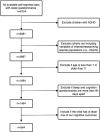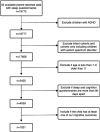Associations between a novel measure of sleep health and cognitive functioning in middle childhood: a crosssectional Environmental Influences on Child Health Outcomes cohort study
- PMID: 40917573
- PMCID: PMC12413863
- DOI: 10.1093/sleepadvances/zpaf049
Associations between a novel measure of sleep health and cognitive functioning in middle childhood: a crosssectional Environmental Influences on Child Health Outcomes cohort study
Abstract
Study objectives: Research linking children's sleep to cognitive outcomes is inconsistent and has largely focused on one aspect of sleep, such as duration, rather than measuring multiple dimensions of sleep health. We hypothesized that children's sleep health would be positively associated with inhibitory control and cognitive functioning.
Method: We cross-sectionally assessed 1595 participants (ages 7-11) from the Environmental influences on Child Health Outcomes cohort using the NIH Toolbox Cognition Battery, Environmental influences on Child Health Outcomes Sleep Health of Children and Adolescents questionnaire, and Patient Reported Outcome Measurement Information System Sleep Disturbance/Sleep-related Impairment instruments. We created a novel scale measuring sleep health using dichotomous "good-bad" cutoffs for sleep duration, timing, latency, satisfaction, and alertness. We used generalized estimating equations and random forest models to examine associations between sleep health and inhibitory control, working memory, processing speed, cognitive flexibility, episodic memory, reading decoding, and receptive vocabulary.
Results: Sleep health did not have statistically significant associations with any aspect of cognitive functioning. Notably, over 75 per cent of our sample had good sleep health.
Conclusions: This study assessed sleep health as a multi-faceted construct, distinguishing between "good" and "poor" sleep health across several domains. The absence of statistically significant associations between sleep health and cognitive functioning suggests children's cognitive functioning may not be cross-sectionally related to multidimensional sleep health measures. Experimentally manipulating key sleep domains such as duration or timing (as done in prior research) may be more robust. Future research might benefit from examining the cumulative impact of poor sleep health over time.
Keywords: cognitive functioning; inhibitory control; middle childhood; sleep health; working memory.
© The Author(s) 2025. Published by Oxford University Press on behalf of Sleep Research Society.
Figures





References
Grants and funding
- UG3 OD035540/OD/NIH HHS/United States
- UH3 OD023286/OD/NIH HHS/United States
- UG3 OD035532/OD/NIH HHS/United States
- UG3 OD035519/OD/NIH HHS/United States
- U24 OD035523/OD/NIH HHS/United States
- UH3 OD023287/OD/NIH HHS/United States
- P30 ES013508/ES/NIEHS NIH HHS/United States
- UG3 OD035533/OD/NIH HHS/United States
- UG3 OD035518/OD/NIH HHS/United States
- UG3 OD035529/OD/NIH HHS/United States
- UH3 OD023320/OD/NIH HHS/United States
- UH3 OD023268/OD/NIH HHS/United States
- U2C ES026533/ES/NIEHS NIH HHS/United States
- U24 OD023382/OD/NIH HHS/United States
- UH3 OD023332/OD/NIH HHS/United States
- U2C ES026542/ES/NIEHS NIH HHS/United States
- UG3 OD035509/OD/NIH HHS/United States
- U2C ES026555/ES/NIEHS NIH HHS/United States
- U2C ES030857/ES/NIEHS NIH HHS/United States
- U2C ES026561/ES/NIEHS NIH HHS/United States
- UH3 OD023249/OD/NIH HHS/United States
- UG3 OD035528/OD/NIH HHS/United States
- U2C OD023375/OD/NIH HHS/United States
- UG3 OD035544/OD/NIH HHS/United States
- U24 ES026539/ES/NIEHS NIH HHS/United States
- UH3 OD023318/OD/NIH HHS/United States
- UG3 OD035521/OD/NIH HHS/United States
- UH3 OD023271/OD/NIH HHS/United States
- UG3 OD035508/OD/NIH HHS/United States
- UG3 OD035546/OD/NIH HHS/United States
- U24 OD023319/OD/NIH HHS/United States
- UG3 OD035543/OD/NIH HHS/United States
- U2C ES030851/ES/NIEHS NIH HHS/United States
- U2C ES030859/ES/NIEHS NIH HHS/United States
- UG3 OD035550/OD/NIH HHS/United States
- UG3 OD035537/OD/NIH HHS/United States
- UH3 OD023347/OD/NIH HHS/United States
- UG3 OD035542/OD/NIH HHS/United States
- UG3 OD035526/OD/NIH HHS/United States
- UG3 OD035527/OD/NIH HHS/United States
- UG3 OD035536/OD/NIH HHS/United States
- UG3 OD035513/OD/NIH HHS/United States
- UG3 OD035516/OD/NIH HHS/United States
- UH3 OD023328/OD/NIH HHS/United States
LinkOut - more resources
Full Text Sources
Research Materials

